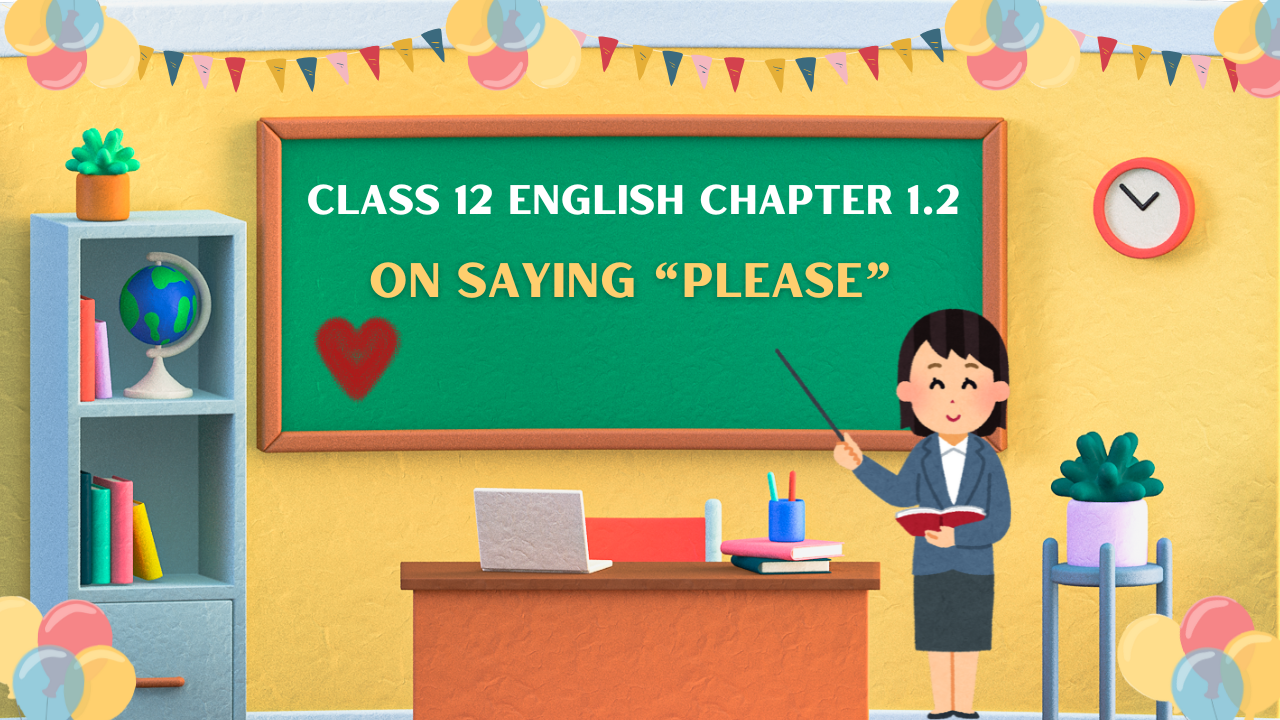Balbharti Yuvakbharati English 12th Digest Chapter 1.2 On Saying “Please” Notes, Textbook Exercise Important Questions and Answers.
Class 12 English Chapter 1.2 On Saying “Please” Question Answer Maharashtra Board
12th Std English Chapter 1.2 Brainstorming Question Answer
Yuvakbharati English Navneet 12th Digest PDF Free Download Maharashtra Board
Question 1.
List the words of courtesy that we use in our daily life. Discuss them with your partner and explain the purpose of using each.

Answer:
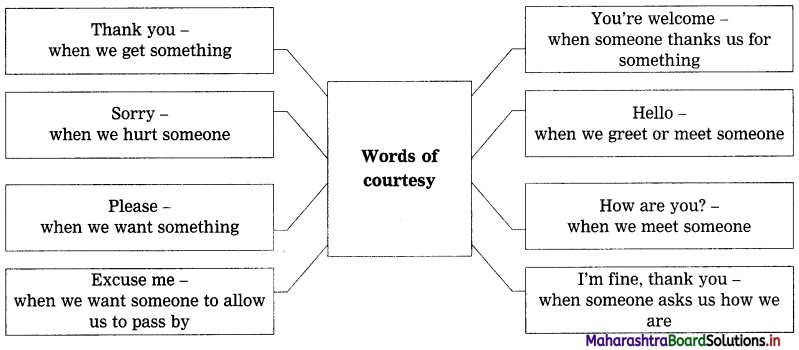
Question 2.
Listed below are a few character traits of people. Some are positive traits, while others are not. Tick [✓] the ones you feel are desirable.

Answer:

Question 3.
Etiquette and manners are very important for a person to live in the society. Read the following and put them in proper columns:
- To receive phone calls while you are in a lecture or class.
- To knock before you enter your Principal’s office.
- To thank the person who offers you tea or coffee.
- To be polite and courteous to others.
- To leave the classroom without the teacher’s permission.
- To occupy the seats reserved for ladies or physically challenged or elderly people on a bus or a train.
Answer:
| Appropriate | Inappropriate |
| 1. To knock before you enter your Principal’s office. | 1. To receive phone calls while you are in a lecture or class. |
| 2. To thank the person who offers you tea or coffee. | 2. To leave the classroom without the teacher’s permission. |
| 3. To be polite and courteous to others. | 3. To occupy the seats reserved for ladies or physically challenged or elderly people on a bus or a train. |
(A1)
Question (i)
Form groups and explain the following words with examples:
Answer:
1. Humility: being free from pride and arrogance – greatest example our former President Dr. A.P.J. Abdul Kalam – remember that ‘pride comes before a fall’ – always realize that there are people better than you are – Socrates said ‘One thing only I know, and that is that I know nothing. ’
2. Self-esteem: self-respect; confidence in one’s own worth or abilities – accept oneself as one is – everyone is different and unique – highly positive quality – leads to achievements, success, healthy relationships – can be developed with a little effort.
3. Gratitude: thankfulness for something that you have got – ready to show appreciation for something – towards the Almighty, towards those who have helped you – strengthens relationships with others – creates positivity.
4. Courtesy: means good manners and polite behavior – means being kind and compassionate towards others – should be real, not artificial – creates good impression – one will be liked by all – human quality not present in animals.
5. Generosity: kindness; big-heartedness – the act of being kind, selfless and giving towards others – very positive trait – influences others – when one is generous, one feels good – many religions consider this a great virtue – encourage charity.
6. Sympathy: feelings of pity and sorrow for someone else’s misfortune – leads to stronger relationships – offering condolences when someone dies – helps us to bond with others-makes the other person’s distress less – beautiful emotion – should be developed.
7. Empathy: the ability to understand and share the feelings of another – putting yourself in the shoes of the other person – different from kindness or pity – listen when people talk – see things from the other person’s point of view – makes one a very humane person.
Question (ii)
Have a Group Discussion on the topic ‘The need of soft skills at the workplace’. Use the following points:
Answer:
(a) Written and verbal communication (writing notes, letters, memos, reports, instructions, speeches, presentations, etc.)
(b) Ways of interacting with others (showing courtesy, sympathy, cooperation, empathy, strictness, gratitude, humility, team work, etc.)
(c) Creative abilities (preparing reports, presentations, letters, etc.)
(d) Emotional intelligence (showing understanding, compassion, empathy, team work, motivation, self-awareness, etc.)
(A2)
Question (i)
Read the text and state whether the following statements are True or False. Correct the False statements.
(a) Bitter problems in day-to-day life can be solved by sweet words.
(b) Great wars could have been avoided by a little courtesy.
(c) Observance of etiquette in a normal situation is important but more important is their observance when the situation is adverse.
(d) Words like ‘please’ and ‘thank you’ help us in making our passage through life uneasy.
(e) The law permits anybody to use violence, if another person is discourteous.
Answer:
True statements:
(a) Bitter problems in day-to-day life can be solved by sweet words.
(b) Great wars could have been avoided by a little courtesy.
(c) Observance of etiquette in a normal situation is important but more important is their observance when the situation is adverse.
False statements:
(d) Words like ‘please’ and ‘thank you’ help us in making our passage through life uneasy.
(e) The law permits anybody to use violence, if ; another person is discourteous.
Corrected statements :
(d) Words like ‘please’ and ‘thank you’ help us in making our passage through life easy.
(e) The law does not permit anybody to use violence, if another person is discourteous.
Question (ii)
Select the most appropriate sentences which suggest the theme of the essay.
(a) The essay tells us about courtesy, civility, morality, responsibility and control.
(b) The essay explores the difficulties that can be incurred by an individual when dealing with the public.
(c) One can keep one’s peace of mind without having to lower themselves to the level of the perceived offender.
(d) People with low self-esteem are generally difficult to work with and they look down upon others to get a feeling of superiority.
Answer:
(a) The essay tells us about courtesy, civility, morality, responsibility and control.
(c) One can keep one’s peace of mind without having to lower themselves to the level of the
perceived offender.
(iii)
Question (a)
Find the reasons for the liftman’s uncivilized behaviour.
Answer:
Reasons for the liftman’s uncivilized behaviour when the passenger was rude and ill-mannered towards him:
- he was acutely hurt by the slur cast by the passenger on his social status
- the passenger’s discourtesy was a wound to his self-respect
- he felt insulted by the passenger’s discourtesy.
Question (b)
List the people and their behaviour that made the passenger rude and ill- mannered.

Answer:
The people who made the passenger rude and ill-mannered:
[housemaid] → [cook] → [employer’s wife] → [employer] → [passenger] → [lift-man]
Question (iv)
Good manners are required in our daily life for making our social contacts more cooperative and friendly. Illustrate the behaviour of the polite conductor with different people in various situations.
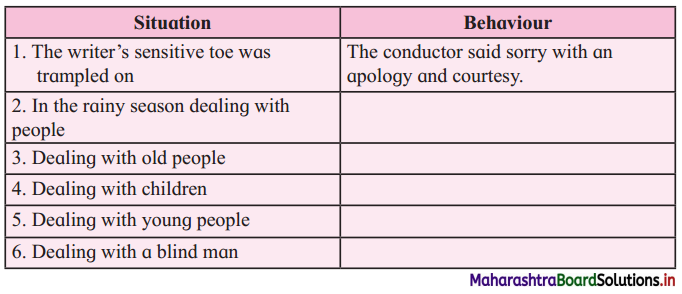
Answer:
| Situation | Behaviour |
| 1. The writer’s sensitive toe was trampled on | The conductor said sorry with an apology and courtesy. |
| 2. In the rainy season dealing with people | He would run up the stairs to give someone the tip that there was “room inside”. |
| 3. Dealing with old people | He was as considerate as a son. |
| 4. Dealing with children | He was as solicitous as a father. |
| 5. Dealing with young people | He always indulged in some merry jest with them. |
| 6. Dealing with a blind man | He set him down safely on the pavement and then took him wherever he wanted to go, after telling the driver to wait for a while. |
Question (v)
Discuss and Write the impact of good temper and kindliness on society in the light of the good-mannered conductor.
Answer:
The conductor was always cheerful and kind-hearted to everyone in the bus. This spread to his passengers and they too became cheerful and good-humored. They would naturally pass on this feeling after getting off the bus. Thus, in society, if people are good-tempered, cheerful and kind, it will spread to others and they too will start behaving in a similar manner. This will lead to a happy and compassionate society.
Question (vi)
‘A modest calling can be made dignified by good temper and kindly feeling’. Explain the statement with examples.
Answer:
This means that whatever career or job one has, however simple or modest, it can be made more dignified by behaving in a good- tempered and cheerful manner and with kindliness towards the people one comes in contact with. For example, even a simple job like that of a security guard at a mall can be made pleasant and dignified if the guard smiles and says ‘Thank you’ or ‘Good morning’ every time he/she checks a person.
A sweeper’s job can also be made more dignified if he/she just nods and smiles at passers-by or helps them if they are in need.
Question (vii)
The service of the police is necessary for the implementation of law in our society. Do you think you require this service for a good social environment? Discuss and write.
Answer:
No, we cannot have the police monitoring us for social and moral offences. For example, one cannot be punished if one refuses to smile at an acquaintance or say Thank you’. One cannot be punished if one doesn’t hold the door open for the person who is following.
These are good manners, or courtesy, and they have to be taught right from childhood, and they will change in different cultures and different circumstances. Whether a person follows them or not depends on the individual. However, if these little courtesies are followed, life will become much simpler and more pleasant for everyone.
(A3)
Question (a)
Find out the words in Column B which collocate with the words in Column A:
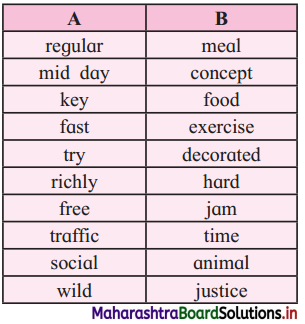
Answer:
| A | B | Answer |
| regular | meal | regular exercise |
| mid day | concept | mid-day meal |
| key | food | key concept |
| fast | exercise | fast food |
| try | decorated | try hard |
| richly | hard | richly decorated |
| free | jam | free time |
| traffic | time | traffic jam |
| social | animal | social justice |
| wild | justice | wild animal |
Question (b)
Learning collocations is essential for making your English sound fluent and natural. Make the following collocations and use them in your own sentences.
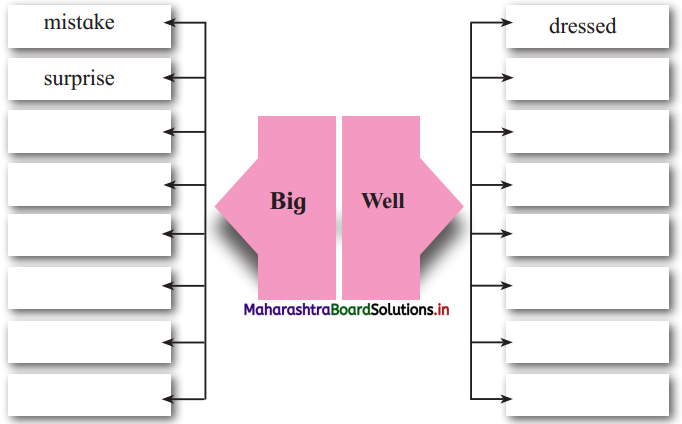
Sentences:
(1) BIG:
- It was a big mistake to hold a party on a rainy day.
- “Did you get a big surprise when you saw me?” asked the little girl to her mother.
- There was a big welcome waiting for the winning team.
- The hungry beggar prayed that he would get a big meal at the rich man’s home.
- Writing the difficult exam was no big deal for the intelligent boy.
- Rohan realized that it would be a big challenge for him to win the match.
- The discovery of a new element was big news in the scientific community.
- Losing the beauty contest was a big shock for the arrogant girl.
(2) WELL :
- The well-dressed man jumped over the puddle carefully.
- The advice the teacher gave Rita was well-meant, but Rita did not like it.
- The cook was happy to see the well-stocked cupboard.
- Little Naina was well-pleased with her birthday gift.
Question (ii)
Sometimes while using a word in a sentence, we have to change its word class. we can make several more words from the root word.
we can make several new words from the root word.
I asked Sumit to ……………. my pencil for me. (sharp).
I asked Sumit to sharpen my pencil for me.
Question 1.
Now read the following sentences and use the words given in the brackets. Change the word class and rewrite the sentences.
(a) Leena was eating a very …………. apple and obviously enjoying it. (crunch)
(b) This picture looks …………… (colour)
(c) I’m afraid that your behaviour is just not ……………. (accept)
(d) I like my elder brother. He is very ……………. (help)
Answer:
(a) Leena was eating a very crunchy apple and obviously enjoying it.
(b) This picture looks colourful.
(c) I’m afraid that your behaviour is just not acceptable.
(d) I like my elder brother. He is very helpful.
Complete the following table. Put a cross if a word class does not exist.
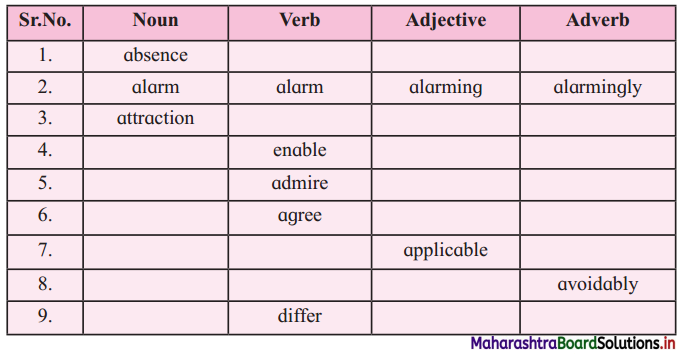
Question (iii)
Write appropriate expressions and words you have to use while facing an interview :
Answer:
(a) May I come in?
(b) May I have a seat?
(c) Thank you.
(d) I’m sorry, but I did not catch what you said.
(5) Please let me know
Question (b)
You are writing a letter of complaint. List the proper expressions that you would like to write.
Answer:
- I disagree.
- I’m sorry to say that….
- I would like to suggest….
- This was not expected from a company like yours.
- Please replace the defective piece as soon as possible.
Question (iv)
Distinguish between a legal offence and a moral offence on the basis of the extract.

Answer:
| Legal offence | Moral offence |
| Burglary | Rude behaviour |
| Assault | Discourtesy |
| Battery | Haughtiness |
| Laceration of one’s feelings |
Question (v)
Find out the meaning of the phrase ‘give and take’ and use it in your own sentence.
Answer:
give-and-take – Meaning: exchange of ideas Sentence – The TV stars engaged in an interesting give-and-take which was enjoyed by the audience.
Question (vi)
Complete the table with polite expressions that we must use in our day-to-day life:
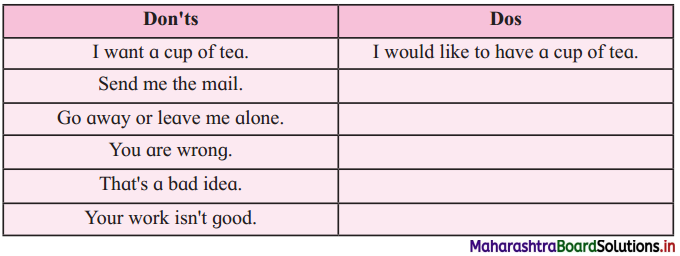
Answer:
| Don’ts | Dos |
| I want a cup of tea. | I would like to have a cup of tea. |
| Send me the mail. | Please send me the mail. |
| Go away or leave me alone. | Please let me be by myself. |
| You are wrong. | Are you sure you’re right? |
| That’s a bad idea. | That is not a very good idea, is it? |
| Your work isn’t good. | Your work can do with some improvement |
(A4)
Question (i)
Edit the given paragraph using a/ an/the wherever necessary:
Rakesh is a/an ideal son who remains devoted to his father as he grows professionally to become a/the famous doctor. As his father grows old, he takes care to spend time with his father, bringing him tea in a/the morning and taking him out for a/the walk in an/the evening.
Answer:
Rakesh is an ideal son who remains devoted to his father as he grows professionally to become a famous doctor. As his father grows old, he takes care to spend time with his father, bringing him tea in the morning and taking him out for a walk in the evening.
Question (ii)
Spot the errors in each of the following sentences and correct the incorrect ones:
Question (a)
Radha brought pens and distributed them between her five children.
Answer:
Radha bought pens and distributed them among her five children.
Question (b)
Jayshree and Sujata sat besides each other in complete silence.
Answer:
Jayshree and Sujata sat beside each other in complete silence.
Question (c)
His best friend Vijay was blind within one eye.
Answer:
His best friend Vijay was blind in one eye.
Question (d)
One could dare to encroach on his rights.
Answer:
One could not dare to encroach on his rights.
Question (e)
She was taken with surprise when she saw the famous Taj Mahal.
Answer:
She was taken by surprise when she saw the famous Taj Mahal.
Question (f)
It is not possible to exchange the goods once the sale has been completed.
Answer:
It is not possible to exchange goods once the sale has been completed, (‘the’ is deleted.)
Question (g)
Dr. Sengupta has been trying to master the craft for the last five years.
Answer:
No error in this sentence.
Question (h)
The top-ranking candidates will be appointed in senior jobs in banks.
Answer:
The top-ranking candidates will be appointed | to senior jobs in banks.
Question (i)
She knows very well what is expected from her but she is unable to perform.
Answer:
She knows very well what is expected of her but she is unable to perform.
Question (j)
They will put on a note in this regard for your consideration.
Answer:
They will put up a note in this regard for your consideration.
Question (iii)
Read the following.
Santosh purchased a computer. He read the operating manual and followed the instructions.
(a) He linked the monitor, keyboard and printer.
(b) He plugged in the main cable.
(c) He switched on the monitor at the back.
(d) When the light appeared on the screen, he placed the Day Disk in Drive A.
(e) He pushed in the disk until the button clicked out.
(It took about 30 seconds for the computer to load the program.)
(f) He pressed the Drive button and the disk shot out.
(g) He replaced the Day Disk with the Document Disk.
(h) He pressed function key 7.
Convert these sentences into passive voice by filling in the blanks.
Firstly the monitor, keyboard and printer were linked up. Then the main cable was plugged in. The monitor was switched on at the back. When the light appeared on the screen, the Day Disk was placed in Drive A. The disk was pushed in until the button clicked out. It took the computer 30 seconds to load the program. The drive button was pressed and the disk shot out. The Day Disk was replaced with the Document Disk. Finally, the function key 7 was pressed. The word processor was then ready to use.
(A5)
Question (i)
Write a speech on ‘Courtesy is the light of life’ with the help of the following points.
(a) People have a good impression of you.
(b) You will be acknowledged and appreciated by all.
(c) You will he happier and contented with life.
Answer:
Courtesy is the light of life
Dear friends,
Good morning. You may be surprised with the topic I have chosen for this speech, for today the word ‘Courtesy’ seems to be an old-fashioned word for us. But it is really the light of life. I, Shivam Goswami, would like to say a few words on why I think so.
First of all, what does courtesy mean? It means good manners and polite behaviour. It means being kind and compassionate towards someone. When you are courteous, people have a good impression of you; but that is not the reason for being courteous. Politeness should be real, and not artificial.
A courteous person will be appreciated by all. People will like to spend time with him/her and find pleasure in the person’s company. Someone may ask ‘What is courteous behaviour’? Saying simple words like ‘Please’, ‘Thank you’, ‘Excuse me’ and ‘Sorry’ is courteous behaviour. Helping a person who has fallen is courteous behaviour. Holding the lift door open for someone is courteous behaviour.
When a person is courteous, people are automatically courteous in return. This leads to a more polite and happier society. As I conclude, I would like to ask all of you to do something for a week: Be courteous. Then you will see the returns and realize the truth of what I am saying. Thank you for listening to me so patiently. Bye.
Question (ii)
‘Manners maketh man’ – Expand the idea in your own words with proper examples.
Answer:
Manners maketh man
‘Manners maketh Man’ : so goes a famous saying. In the world of today, people are judged by their manners and conduct. Manners distinguish us from animals, and make us human. A person who is courteous and considerate towards others is said to possess good manners. Such a person is respectful to his superiors, courteous to his equals and sympathetic towards his subordinates. He always shows concern for the well-being and comfort of others. He uses words like ‘Please’, ‘Thank you’ and ‘Sorry’ while talking to others; he helps senior citizens and those in need.
Everyone likes a person who speaks and behaves politely and treats others respectfully. Good manners cost practically nothing but can buy everything. They win us friends and help us influence people. They make the world a happier place to live in by reducing friction and avoiding tension.
When we meet a person for the first time, it is the person’s courtesy which impresses us deeply. Good manners are generally taught by parents at home, and by teachers in school. Manners that are learnt during childhood generally remain with us throughout our lives. They become a part of our personality. Hence, it is desirable that good manners are instilled in children when they are very young, so that they grow up to become courteous, considerate adults.
(A6)
Question (i)
Read A. G. Gardiner’s essay “The Open Window’ and compare its theme with the essay ‘On Saying “Please.”
Question (ii)
‘Nothing clears up my spirits like a fine day’ – Keats. Collect information of the poet Keats and write it in your notebook.
(A7)
Question (i)
Soft skills are required in all walks of life including careers and industries. They are increasingly becoming the essential skills of today’s workforce. Soft skills are an integral part of finding, attracting and retaining clients also. Highly developed presentation skills, networking abilities, and etiquette awareness can help you win new clients and gain more work. The following are considered the most important soft skills.
image
Question (ii)
Following are some of the institutions where you will get the courses related to soft skills.
(a) Indian Institute of Management, Ahmedabad, Gujarat
(b) Indian School of Business Management, Hyderabad
(c) XLRI – Xavier School of Management, Jamshedpur
(d) Indian Institute of Foreign Trade, New Delhi
Jobs available at –
- Customer service centre
- Management schools
- Hotel industry, etc.
Yuvakbharati English 12th Digest Chapter 1.2 On Saying “Please” Additional Important Questions and Answers
Read the extract and complete the activities given below.:
Global Understanding:
Question 1.
Read the following sentences and find out True and False sentences. Correct the false sentences:
1. The liftman invited the passenger into the lift.
2. If you knock down a burglar, the law will acquit you.
3. There is no legislation against bad manners.
4. The complainant had to pay a fine.
Answer:
True sentences:
2. If you knock down a burglar, the law will acquit you.
3. There is no legislation against bad manners.
False sentences:
1. The liftman invited the passenger into the lift.
4. The complainant had to pay a fine,
Corrected sentences:
1. The liftman threw the passenger out of the lift.
4. The liftman had to pay a fine.
Question 2.
Explain the penalty, if any, that one has to pay if one is rude or boorish.
Answer:
There is no penalty to pay if one is rude or boorish except the penalty of being called a ill-mannered person.
Question 3.
The behaviour of the people who made the passenger rude and ill-mannered:
Answer:
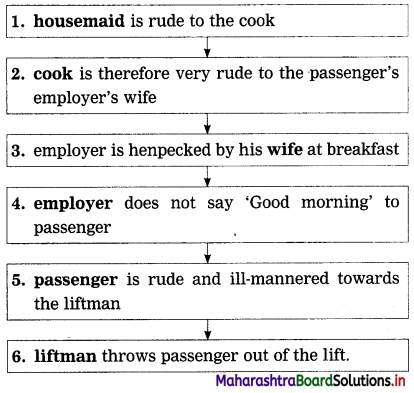
Question 4.
Complete the following:
(The answers are given directly and underlined.)
Answer:
- The first requirement of civility is that we should acknowledge a service.
- The Underground Railway Company insists that their employees are civil.
- The words which make life smooth are ‘please’ and ‘thank you’.
- The job of a bus conductor is very difficult and sometimes painful.
Question 5.
Tick mark the correct words:
(The answers are marked directly.)
Answer:
- The author finally found/did not find the money for the ticket.
- The author thought he had left home with/ without any money.
- The conductor gave/did not give the author a ticket.
- The author was pleased/displeased with the conductor.
Question 6.
Complete the web by choosing the correct words from the brackets that describe the conductor: (mean cheerful considerate grumpy patient solicitous impatient polite irritable good-tempered haughty good-natured kind)
Answer:
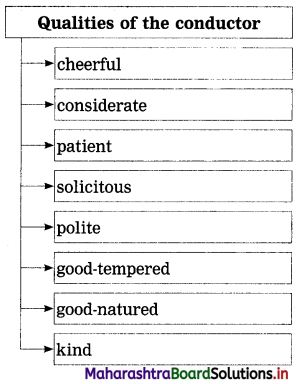
Question 7.
Complete the following :
(The answers are given directly and underlined.)
Answer:
- A modest career can he made dignified by good temper and kindly feeling.
- The law can only protect us against material) attack.
- The narrator says he does not want to apologise for praising an unknown bus conductor.
- A man who is polite may lose material advantage but he always has the spiritual victory.
Complex Factual:
Question 1.
Explain what the liftman wanted the passenger to do, and what happened afterwards.
Answer:
The passenger, on entering the lift, said ‘Top’. The liftman wanted him to say ‘Top please’. The passenger refused to do so. The liftman, instead of taking him to the top floor, threw him out of the lift.
Question 2.
Explain the sentence: The pain of a kick on the shins soon passes away but the pain of a wound to our self-respect or our vanity may poison a whole day.
Answer:
This means that if we are physically attacked i and injured, the pain of the wounds will soon heal and be forgotten. But if our self-respect or pride is hurt, it may poison our lives and behaviour for a much longer time.
Question 3.
It is not possible for the law to become the guardian of our private manners. Explain.
Answer:
The area of moral offences is quite vast and no laws or commandments can cover this area. In addition, social civilities, speech and manners are of so many types and the interpretation of these (whether they are good or bad) is so different that no court could administer a law which governed them. Hence, it is not possible for the law to become the guardian of our private manners.
Question 4.
Mention a couple of ways to keep the machine of life oiled and running sweetly.
Answer:
We can keep the machine of life oiled and running sweetly by using courteous words like ‘Please’ and ‘Thank you’ to acknowledge a service.
Question 5.
Complete the following:
(The answer is given directly and underlined.)
Answer:
The public owes much to the Underground Railway Company because they insist on a certain standard of civility in their employees, and take care that the standard is observed.
Question 6.
Complete the table:
Answer:
| The words | Who said! | To whom | When |
| 1. “I haven’t a copper on me.” | The narrator | The conductor | When the conductor and the narrator found that he had left home without any money in his pocket. |
| 2. “Oh, you’ll see me some day alright.” | The conductor | The narrator | When the narrator address) he could send the borrowed asked where (to which money. |
| 3. “Where shall I send the fare?” | The narrator | The conductor | When the narrator wanted to repay the ticket money to the conductor. |
| 4. “Where do you want to go?” | The conductor | The narrator | When the narrator explained that he did not have any money on him, and the conductor |
Question 7.
Write the narrator’s opinion about how the liftman should have dealt with the passenger’s uncivility. Give reasons for the same.
Answer:
In the opinion of the writer, the liftman, instead of throwing the passenger out of the lift, should have treated him with elaborate politeness. He would have then had the victory not only over the rude passenger, but also over himself, and that was the spiritual victory that was more important. His revenge would then have been more subtle and effective.
Inference/Interpretation/Analysis :
Question 1.
Name the ‘unpleasant specimen’ mentioned in the extract and describe his behaviour.
Answer:
The ‘unpleasant specimen’ mentioned in the extract is the type of bus conductor who regards his passengers as natural enemies whose chief purpose on the bus is to cheat him, and who can only be kept honest by using a loud voice and an aggressive manner.
Question 2.
Describe the stale old trick, according to the conductor.
Answer:
Pretending that you have forgotten your purse at home, and hence do not have the fare for the ticket is a stale old trick, according to the conductor. (The conductor does not say this the narrator only imagines that he may do so.)
Question 3.
Describe the reactions of the bus conductor.
Answer:
No, the conductor did not think that the narrator was dishonest. He cheerfully accepted what the narrator said without doubting him and offered him a free ticket.
Question 4.
Describe the experience which made the narrator comfortable in the bus.
Answer:
The conductor had trampled on the narrator’s sensitive toe, causing him pain and agony. However, the conductor had then explained matters and apologized so profusely that the narrator forgot his pain and anger. After this experience, the narrator always observed his constant good nature and cheerful behaviour with pleasure and felt comfortable in his presence.
Question 5.
Describe the narrator’s justification of his praise of the conductor.
Answer:
The narrator says that if the famous poet Wordsworth could gain wisdom from a poor leech-gatherer, he sees no reason why ordinary people should not take lessons on conduct from a bus conductor, who shows how a modest job can be made more dignified by behaving in a good-tempered and cheerful manner and with kindliness towards the people one comes in contact with.
Personal Response:
Question 1.
Describe a person you have come across who is always polite and helpful. What do you think about him/her?
Answer:
The security guard of our building is always polite and helpful. He will help senior citizens get in and out of their cars or into the lift; he will help any person who has heavy bags. He also replies politely to any question asked by anyone. We all like him very much and often share our chocolates and biscuits with him. We also give him books, stationery and toys for his little child.
Question 2.
Describe a pleasant/unpleasant experience you have had with a bus conductor.
Answer:
This is an experience I had when I was new to Mumbai. I got into a bus and asked the conductor for a ticket to Dadar. The conductor shook his head and told me that I had got into the bus going in the wrong direction. He patiently explained that I would have to get off at the next stop, cross the road, and catch a bus having the same number but going in the opposite direction. He even pointed out the bus stop to me. Though I felt a bit embarrassed, I thanked him for his kindness.
Question 3.
Give your opinion about the conductor’s behaviour.
Answer:
The conductor was really a good and kind human being who saw the best in everyone and believed everyone. He was ready to pay the fare for the narrator’s ticket himself, even though he was not sure whether it would be returned. It is difficult to find such generous and helpful people in the world today, and it leaves a very pleasant feeling in the heart when you do.
Language Study:
Question 1.
The law does not compel me to say ‘Please’.
(Rewrite as an interrogative sentence.)
Answer:
Does the law compel me to say ‘Please’?
Question 2.
It was a question of ‘Please’.
(Add a question tag.)
Answer:
It was a question of ‘Please’, wasn’t it?
Question 3.
It will permit me to retaliate with reasonable violence.
(Pick out the finite and non-finite verbs.)
Answer:
will permit – finite verb;
to retaliate – non-finite verb (infinitive)
Question 4.
The pain of a wound to our self-respect may poison a whole day.
(Pick out the auxiliary and state its function.)
Answer:
may – possibility
Question 5.
For there are few things more catching than bad temper.
(Write the part of speech of the underlined word.)
Answer:
Gerund
Question 6.
Bad manners probably do more to poison the stream of general life than all the crimes in the calendar. (Rewrite in the present perfect tense.)
Answer:
Bad manners have done probably more to poison the stream of general life than all the crimes in the calendar.
Question 7.
There is a social practice much older and much more sacred than any law which enjoins us to be civil.
(Rewrite using ‘not only … but also… ’)
Answer:
There is a social practice not only much older but also much more sacred than any law which enjoins us to be civil.
Question 8.
Most people will have a certain sympathy with him. (Rewrite using the verb form of the underlined word.)
Answer:
Most people will sympathize with him.
Question 9.
Here and there you will meet an unpleasant specimen who regards the passengers as his natural enemies. (Replace the verb in the future tense with a modal auxiliary showing possibility.)
Answer:
Here and there you might meet an unpleasant specimen who regards the passengers as his natural enemies.
Question 10.
I had left home without any money in my pocket. (Pick out the verb and state the tense.)
Answer:
had left-past perfect tense.
Question 11.
I know that stale old trick.
(Rewrite beginning ‘That stale old trick ’.)
Answer:
That stale old trick is known to me.
Question 12.
I said it was very kind of him.
(Identify the clauses.)
Answer:
I said – main clause
it was very kind of him – subordinate noun clause
Question 13.
I began to observe him whenever I boarded his bus. (Pick out the subordinate clause and state the type.)
Answer:
subordinate clause – whenever I boarded his bus; adverb clause of time.
Question 14.
He seemed to have an inexhaustible fund of patience and a gift for making his passengers comfortable. (Rewrite using ‘as well as…’)
Answer:
He seemed to have an inexhaustible fund of patience as well as a gift for making his passengers comfortable.
Question 15.
In lightening their spirits he lightened his own task. (Rewrite using the verb form of the underlined word.)
Answer:
When he lightened their spirits he lightened his own task.
Question 16.
A very modest calling may be dignified by good temper and kindly feeling. (Rewrite as an interrogative sentence.)
Answer:
Can’t a very modest calling be dignified by good temper and kindly feeling?
Question 17.
“I never give the wall to a scoundrel,” said a man who met Chesterfield one day in the street. “I always do,” said Chesterfield, stepping with a bow into the road. (Rewrite using reported speech.)
Answer:
A man who met Chesterfield one day in the street said that he never gave the wall to a scoundrel. Chesterfield, stepping with a bow into the road, replied that he always did.
Question 18.
The polite man may lose the material advantage, but he always has the spiritual victory. (Rewrite beginning ‘Though’)
Answer:
Though the polite man may lose the material advantage, he always has the spiritual victory.
Vocabulary:
Find out the meanings of the following phrases and use them in your own sentences.
Question 1.
knock someone down –
Answer:
Meaning: to hit someone forcefully so that he/she falls down
Sentence: The young boy was so angry with the bully that he knocked him down.
Question 2.
to comply with :
Answer:
Meaning: to obey.
Sentence: We must comply with the laws of the country we live in.
Question 3.
Find out 2 words with prefixes and 2 with suffixes from the extract and write them down.
Answer:
1. Words with prefixes : discourtesy, uncivil.
2. Words with suffixes : instruction, reasonable.
Question 4.
Complete the following:
Answer:
- A liftman is a person who is employed to operate a lift.
- An assailant is a person who attacks another person.
- A complainant is a person who makes a formal complaint in a law court.
- A burglar is a person who illegally enters houses and steals things.
Question 5.
Write the meanings of the following words :
- redress
- henpecked
- black eye.
Answer:
- redress – to set right to remedy.
- henpecked – being controlled by and frightened of one’s wife.
- black eye – an area of skin around the eye that has gone dark because it has been hit.
Question 6.
Use the phrase ‘a black eye’ in your own sentence.
Answer:
When I saw my friend with a black eye, I knew that he had been in a fight with someone.
Question 7.
Find out 2 words with suffixes and 2 compound words from the extract and write them down.
Answer:
1. words with suffixes: vanity, really.
2. Compound words: breakfast, housemaid.
Question 8.
Write the meaning of the following words:
- endorse
- verdict
- resentment
- calling
Answer:
- endorse – express support
- verdict – judgement
- resentment – anger
- calling – vocation or profession.
Question 9.
Find out 2 words with suffixes from the extract and write them down.
Answer:
Words with suffixes : sympathy, requirement.
Question 10.
Find out two words with prefixes and two with suffixes from the extract and write them down.
Answer:
1. Words with prefixes: unfriendliness, inconvenience
2. Words with suffixes: existence, discovery
Question 11.
Pick out four adverbs of manner from the extract.
Answer:
coldly, cheerfully, luckily, easily.
Question 12.
Write the meanings of the followings words:
- countenance
- treading
- assured (someone)
- benediction
- uncouth
Answer:
- countenance – face.’
- treading – walking on.
- assured (someone) – made something certain to someone.
- benediction – a blessing.
- uncouth – impolite, unrefined.
Question 13.
Find out 2 words with prefixes and 2 with suffixes from the extract and write them down.
Answer:
1. words with prefixes: inexhaustible, unusually
2. words with suffixes: investment, cheerful
Question 14.
Write the meaning of ‘moral affront’.
Answer:
moral affront: a deliberate offence or insult to one’s dignity or self-respect.
Question 15.
Find out the meaning of the following phrase and use it in your own
sentence: lower than the angels
Answer:
lower than the angels – Meaning : less than perfect
Sentence: The unexpected behaviour of the religious men was somewhat lower than the angels.
Question 16.
Write four words with suffixes from the extract and write them down.
Answer:
agreement, politeness, institution, sweeten.
Note: Students can find more words on their own.
Vocabulary:
A Collocation is a combination of words in a language that often go together. They habitually occur together and hence convey some meaning by association, e.g. early morning, hot dinner, fast train.
Non-Textual Grammar:
Do as directed:
Question 1.
Hearing the sound of music from a side street, Mona had an idea.
(Rewrite as a compound sentence.)
Answer:
Mona heard the sound of music from a side-street and had an idea.
Question 2.
Siddharth could not ask his father for a cricket bat.
(Rewrite using the antonym of ‘able’.)
Answer:
Siddharth was unable to ask his father for a cricket bat.
Question 3.
“I will try,” the lady smiled.
(Rewrite in indirect speech.)
Answer:
The lady smiled and said that she would try.
Spot the error in the following sentences and rewrite them correctly:
Question 1.
I picked some of the lovely, tasty fruits and had eaten my fill of them.
Answer:
I had picked some of the lovely, tasty fruits and had eaten my fill of them.
Question 2.
I miss my friends a lots.
Answer:
I miss my friends a lot.
12th Std English Questions And Answers:
- An Astrologer’s Day Class 12 Questions And Answers
- On Saying “Please” Class 12 Questions And Answers
- The Cop and the Anthem Class 12 Questions And Answers
- Big Data-Big Insights Class 12 Questions And Answers
- The New Dress Class 12 Questions And Answers
- Into the Wild Class 12 Questions And Answers
- Why We Travel Class 12 Questions And Answers
- Chapter 1.8 Voyaging Towards Excellence Class 12 Questions And Answers
